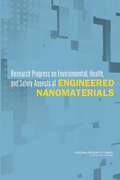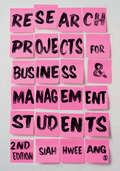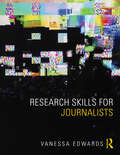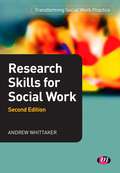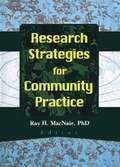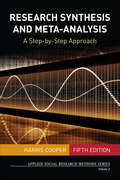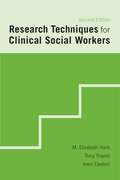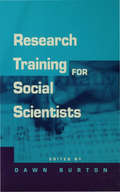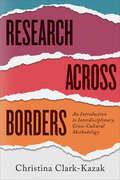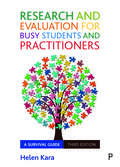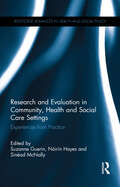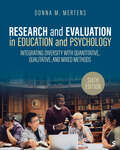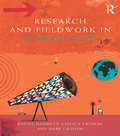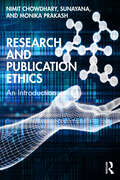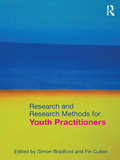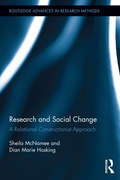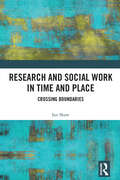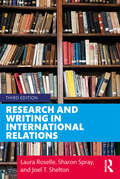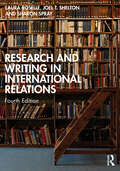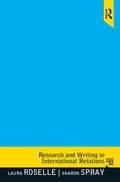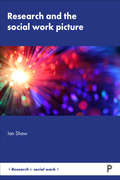- Table View
- List View
Research Progress on Environmental, Health, and Safety Aspects of Engineered Nanomaterials
by Toxicology Committee to Develop a Research Strategy for Environmental StudiesDespite the increase in funding for research and the rising numbers of peer-reviewed publications over the past decade that address the environmental, health, and safety aspects of engineered nanomaterials (ENMs), uncertainty about the implications of potential exposures of consumers, workers, and ecosystems to these materials persists. Consumers and workers want to know which of these materials they are exposed to and whether the materials can harm them. Industry is concerned about being able to predict with sufficient certainty whether products that it makes and markets will pose any environmental, health or safety issues and what measures should be taken regarding manufacturing practices and worldwide distribution to minimize any potential risk. However, there remains a disconnect between the research that is being carried out and its relevance to and use by decision-makers and regulators to make informed public health and environmental policy and regulatory decisions. "Research Progress on Environmental, Health, and Safety Aspects of Nanomaterials" evaluates research progress and updates research priorities and resource estimates on the basis of results of studies and emerging trends in the nanotechnology industry. This report follows up the 2012 report "A Research Strategy for Environmental, Health, and Safety Aspects of Engineered Nanomaterials," which presented a strategic approach for developing the science and research infrastructure needed to address uncertainties regarding the potential environmental, health, and safety risks posed by ENMs. This new report looks at the state of nanotechnology research, examines market and regulatory conditions and their affect on research priorities, and considers the criteria for evaluating research progress on the environmental, health, and safety aspects of nanotechnology.
Research Projects for Business & Management Students
by Siah Hwee AngThis second edition of Research Projects for Business and Management Students provides students undertaking extended research with a foundation upon which to build their practice. The author sets out each stage of a research project systematically to allow you to follow along and build an understanding of the processes involved in carrying out in depth pieces of research, as well as the functions of commonly used research methods. Conversation boxes throughout will also help situate your learning by providing examples of commonly asked questions, challenges that may occur while you carry out your research and guidance on how to answer them. Professor Siah Hwee Ang is Professor of International Business and Strategy, inaugural Chair in Business in Asia and Director of the NZ’s Southeast Asia Centre of Asia-Pacific Excellence at Victoria University of Wellington, New Zealand.
Research Projects for Business & Management Students
by Siah Hwee AngThis second edition of Research Projects for Business and Management Students provides students undertaking extended research with a foundation upon which to build their practice. The author sets out each stage of a research project systematically to allow you to follow along and build an understanding of the processes involved in carrying out in depth pieces of research, as well as the functions of commonly used research methods. Conversation boxes throughout will also help situate your learning by providing examples of commonly asked questions, challenges that may occur while you carry out your research and guidance on how to answer them. Professor Siah Hwee Ang is Professor of International Business and Strategy, inaugural Chair in Business in Asia and Director of the NZ’s Southeast Asia Centre of Asia-Pacific Excellence at Victoria University of Wellington, New Zealand.
Research Skills for Journalists
by Vanessa EdwardsResearch Skills for Journalists is a comprehensive, engaging and highly practical guide to developing the varied skillset needed for producing well researched, quality journalism across a range of platforms. Illustrated with original interviews and case studies, the book guides readers through a clear understanding of sources of news, as well as illustrating the skills needed to undertake successful digital and non-digital research and to conduct interviews for a variety of media. It examines the skills needed for basic data journalism and presents an in-depth exploration of the different research skills specific to producing print and online text, as well as those for broadcast and multimedia journalism. Key research skills explored in the book include: Developing digital research skills, including researching through search engines, messages boards, discussion groups and web forums, social media, apps, and using user generated content Working with data, including sourcing, auditing and analysing data, data visualisation and understanding the importance of accuracy and context Essential non-digital research skills, including telephone technique, using libraries and working with librarians, understanding copyright, working with picture libraries and research services, and producing freedom of information requests Working directly with people to research stories, including the power of persuasion, tracking down great contributors, managing and protecting sources, planning and managing interviews, and interviewing vulnerable people Researching for multimedia production of stories, including researching a radio story, podcast or video story, and planning for outside broadcasts. Research Skills for Journalists also explores specialist research skills needed for working overseas and investigates new areas, which could be used for journalism research in the future. The book is illustrated with original contributions by journalists from a variety of backgrounds; including veteran investigative journalist John Pilger, pioneering data journalist Simon Rogers and The Bureau of Investigative Journalism’s award-winning reporter Abigail Fielding-Smith. It is an invaluable guide for students and practitioners of journalism to the skills needed for finding and developing original news stories today.
Research Skills for Social Work
by Andrew WhittakerResearch skills are central to successfully completing the social work degree. This title will help students develop those skills and apply them to all aspects of their work. Detailed information is included on a variety of research methods, such as focus groups, literature reviews, questionnaires and interviews, which are fundamental to students' research projects. Packed with useful practical examples, it provides plenty of opportunity for critical examination of research methods and their outcomes.
Research Skills for Social Work (Transforming Social Work Practice Series)
by Andrew WhittakerSocial Work students often find research an intimidating and complex area of study, with many struggling to understand the core concepts and their application to practice. This book presents these concepts in an accessible and user-friendly way. Key skills and methods such as literature reviews, interviews, and questionnaires are explored in detail while the underlying ethical reasons for doing good research underpin the text. For this second edition, new material on ethnography is added.
Research Strategies for Community Practice
by Ray H MacnairIn Research Strategies for Community Practice, you’ll discover how you can more effectively work together with other practitioners and researchers in the interests of knowledge development and practice assessment. You’ll also gain access to the conceptual rationale, research design process, and research utilization process necessary for success in the context of community organizing.Research Strategies for Community Practice raises crucial issues for you and other community practitioners. In chapters on historical research strategies, you’ll discover the need for reform in research procedures, which will aid you in setting goals, establishing political agendas, and exploring new policy directions. In the chapters covering community network analysis, you’ll find human service and support systems. Specifically, your understanding of this vital area of community practice will develop and flourish in these and many other important areas: uses of historical research assessment, planning, and evaluation through network analysis single system research design the research process in community-based empowerment systems collaborative research participants in the context of adolescent healthReaders from all backgrounds, including doctoral students in social work, sociology, and public administration who have an interest in community practice, will want to take a look inside the proven techniques and sound research in Research Strategies for Community Practice. You’ll find a practical community of professional researchers and practitioners who have compiled the most successful strategies for conducting and bettering research in your community practice.
Research Synthesis and Meta-Analysis: A Step-by-Step Approach (Applied Social Research Methods #2)
by Harris CooperThe Fifth Edition of Harris Cooper′s bestselling text offers practical advice on how to conduct a synthesis of research in the social, behavioral, and health sciences. The book is written in plain language with four running examples drawn from psychology, education, and health science. With ample coverage of literature searching and the technical aspects of meta-analysis, this one-of-a-kind book applies the basic principles of sound data gathering to the task of producing a comprehensive assessment of existing research.
Research Synthesis and Meta-Analysis: A Step-by-Step Approach (Applied Social Research Methods #2)
by Harris CooperThe Fifth Edition of Harris Cooper′s bestselling text offers practical advice on how to conduct a synthesis of research in the social, behavioral, and health sciences. The book is written in plain language with four running examples drawn from psychology, education, and health science. With ample coverage of literature searching and the technical aspects of meta-analysis, this one-of-a-kind book applies the basic principles of sound data gathering to the task of producing a comprehensive assessment of existing research.
Research Techniques for Clinical Social Workers
by Tony Tripodi Irwin Epstein M. Elizabeth VonkThis volume has long been an invaluable resource for students and practitioners of social work. It thoroughly and clearly presents research concepts and skills, uniquely organizing them according to assessment and treatment formulation, treatment implementation and monitoring, and evaluation. Also, numerous practice cases and detailed exercises offer a complete grasp of crucial concepts and techniques.This new edition reflects contemporary developments in practice research, such as an emphasis on empirical or evidence-based practice; the importance of evaluation within the managed-care environment; the role of social work ethics in practice research; the value of qualitative research methodology for particular aspects of monitoring and evaluation; and the role of computer technology and the use of the Internet.
Research Training for Social Scientists: A Handbook for Postgraduate Researchers
by Dawn BurtonWith indispensable advice for students from all social science backgrounds, this handbook provides the core conceptual and practical skills to embark on succesful research. The organization of the book reflects the knowledge that is required in order to become a competent and effective researcher. It follows the life-cycle of the research project: it begins with a discussion of ethical and philosphical issues; presents guides to both quantitative and qualitative data collection and analysis; provides help on using computers in research; and includes advice on how to write up and present a research project. Based on the UK Economic and Social Research Council advice on the training which students should undertake in preparation for postgraduate research, this book will be invaluable for all beginning researchers.
Research across Borders: An Introduction to Interdisciplinary, Cross-Cultural Methodology
by Christina Clark-KazakIn order to understand positionality as it relates to research, it is important to learn how to identify and reflect on how knowledge is produced and reproduced. Research across Borders introduces key concepts and methods to understand and critically analyze research in academic books and journals, as well as in media, government reports, and anywhere else information is found. This book addresses the opportunities and challenges of undertaking research in international, cross-border, and cross-cultural contexts. Specifically designed for students studying interdisciplinary or international programs on topics such as human rights, conflict studies, international relations, global development, and migration, Research across Borders provides the methodological, ethical, and epistemological foundations for understanding research across different disciplines. Whether students are gathering information from secondary sources or conducting primary research, Research across Borders aims to help readers become better researchers.
Research and Evaluation for Busy Students and Practitioners: A Survival Guide
by Helen KaraResearch doesn’t exist in a bubble but co-exists with a multitude of other tasks and commitments, yet there is more need for people to save time than ever before. Brilliantly attuned to the demands placed on researchers, this book considers how students, academics and professionals alike can save time and stress without compromising the quality of their research or its outcomes. This third edition: - is fully revised with new chapters on research and evaluation ethics, creative methods of collecting data and how research can make a positive difference; - includes illustrative case studies throughout the book, and each chapter concludes with exercises, discussion questions and a debate topic; - is accompanied by a fully updated companion website. This supportive book is designed for any student or practitioner who wants to know how to do research on top of their main job, and still have a life.
Research and Evaluation in Community, Health and Social Care Settings: Experiences from Practice
by Suzanne Guerin Nóirín Hayes Sinéad McNallyHow can we develop a comprehensive understanding of the research process in community, health and social care settings? Covering all stages of the research process, from funding to dissemination, this book considers the views of funders, researchers, communities and policy makers. Drawing on practical examples and relevant international literature, it sheds light on issues that can arise in the process and presents solutions and strategies to deal with a range of challenges. Organised around a series of themes that capture the essential elements of the research process including covering framing research in theory, commissioning and designing research, utilisation of findings and knowledge transfer, this book provides practical guidance for those involved in child welfare and education, nursing and clinical practices, community studies and the social sciences. It will be a key resource for all those who are interested in developing their understanding of the research and evaluation process in these areas.
Research and Evaluation in Education and Psychology: Integrating Diversity With Quantitative, Qualitative, and Mixed Methods
by Donna M. MertensIdentify, evaluate, and practice good research using Research and Evaluation in Education and Psychology: Integrating Diversity With Quantitative, Qualitative, and Mixed Methods by renowned scholar Donna M. Mertens. This introductory research methods text incorporates the viewpoints of various research paradigms into its descriptions of qualitative, quantitative, and mixed methods as well as program evaluation. The work covers five major paradigms: post-positivist, constructivist, transformative, pragmatic, and Indigenous. Special emphasis on conducting research with culturally complex communities, based on the perspectives of feminists, ethnic/racial minorities, and people with disabilities is a hallmark of this text. In each chapter, the author carefully explains each step of the research process, from the literature review to analysis and reporting. Additionally, each chapter includes a published sample study and abstract to illustrate the concepts discussed in that chapter. The Sixth Edition includes more on community engagement, recent advances in mixed methods, new applications of theoretical frameworks, and the latest research examples. Citations and references have all been updated to reflect the seventh edition of the Publication Manual of the American Psychological Association. Included with this title: LMS Cartridge: Import this title’s instructor resources into your school’s learning management system (LMS) and save time. Don’t use an LMS? You can still access all of the same online resources for this title via the password-protected Instructor Resource Site.
Research and Evaluation in Education and Psychology: Integrating Diversity With Quantitative, Qualitative, and Mixed Methods
by Donna M. MertensIdentify, evaluate, and practice good research using Research and Evaluation in Education and Psychology: Integrating Diversity With Quantitative, Qualitative, and Mixed Methods by renowned scholar Donna M. Mertens. This introductory research methods text incorporates the viewpoints of various research paradigms into its descriptions of qualitative, quantitative, and mixed methods as well as program evaluation. The work covers five major paradigms: post-positivist, constructivist, transformative, pragmatic, and Indigenous. Special emphasis on conducting research with culturally complex communities, based on the perspectives of feminists, ethnic/racial minorities, and people with disabilities is a hallmark of this text. In each chapter, the author carefully explains each step of the research process, from the literature review to analysis and reporting. Additionally, each chapter includes a published sample study and abstract to illustrate the concepts discussed in that chapter. The Sixth Edition includes more on community engagement, recent advances in mixed methods, new applications of theoretical frameworks, and the latest research examples. Citations and references have all been updated to reflect the seventh edition of the Publication Manual of the American Psychological Association. Included with this title: LMS Cartridge: Import this title’s instructor resources into your school’s learning management system (LMS) and save time. Don’t use an LMS? You can still access all of the same online resources for this title via the password-protected Instructor Resource Site.
Research and Fieldwork in Development
by Daniel Hammett Chasca Twyman Mark GrahamResearch and Fieldwork in Development explores both traditional and cutting edge research methods, from interviews and ethnography to spatial data and digital methods. Each chapter provides the reader with an understanding of the theoretical basis of research methods, reflects upon their practice and outlines appropriate analysis techniques. The text also provides a cutting edge focus on the role of new media and technologies in conducting research. The final chapters return to a set of broader concerns in development research, providing a new and dynamic set of engagements with ethics and risk in fieldwork, integrating methods and engaging development research methods with knowledge exchange practices. Each chapter is supported by several case studies written by global experts within the field, documenting encounters and experiences and linking theory to practice. Each chapter is also complimented by an end of chapter summary, suggestions for further reading and websites, and questions for further reflection and practice. The text critically locates development research within the field of international development to give an accessible and comprehensive introduction to development research methods. This book provides an invaluable overview to the practice of international development research and serves as an essential resource for undergraduate and postgraduate student embarking of development fieldwork. It is supported by online resources including extended bibliographies for each chapter, example risk and ethic forms, example policy briefing notes, research reports, links to websites and data sources.
Research and Publication Ethics: An Introduction
by Nimit Chowdhary Sunayana Monika PrakashThis book provides a comprehensive overview of research and publication ethics and guides young researchers on how to conduct ethical research and publish their work responsibly. It presents an understanding of ethical practices in research and how they apply to research and publication by examining the different ethical theories and their application. The book also discusses the different factors influencing ethical decision-making and probes into the ethical issues that can arise in the research process. It explores the different forms of scientific misconduct, such as data fabrication and falsification, plagiarism, and conflicts of interest, and provides strategies for ethical research. The book also details the impact of scientific misconduct on research and publication and the strategies for preventing and detecting misconduct.Aligning to the belief that promoting ethical research practices is essential for advancing science and society, this book will be helpful for young researchers, scholars, aspiring researchers, and academicians interested in ethical research practices in multiple disciplines.
Research and Research Methods for Youth Practitioners
by Simon Bradford Fin CullenRigorous research is crucial to effective work with young people and increasingly youth practitioners need to be able to develop, review and evidence their work using a variety of research and assessment tools. This text equips students and practitioners with a thorough understanding of research design, practice and dissemination, as well as approaches to evidence-based practice. A clear practice framework informs the book, outlining the significance of research to youth work, especially in relation to designing and developing services for young people. Research and Research Methods for Youth Practitioners: Analyses the research/practitioner role Explores the ethical context of research in youth work Offers a thorough analysis of key methodological questions in research in practice Provides a guide to data collection and analysis Presents five principal research strategies for youth work: ethnographic work and visual methods; interviewing and evaluation; surveys and evaluation; the use of secondary data and documentary analysis; and researching virtual and online settings Discusses the implications of research for work with young people as well as its dissemination. Written by experienced researchers and practitioner-researchers, each chapter in this accessible textbook includes an overview, a critical discussion of the pros and cons of the particular method or approach, a case study, a practice-based task, a summary and suggestions for further reading. This textbook is invaluable for student and practising youth workers. It is also a useful reference for other practitioners working with young people.
Research and Social Change: A Relational Constructionist Approach (Routledge Advances in Research Methods)
by Sheila McNamee Dian Marie HoskingThis book bridges scholarly forms of inquiry and practitioners’ daily activities. It introduces inquiry as a process of relational construction, offering resources to practitioners who want to reflect on how their work generates practical effects. There are hundreds of books on research, but in keeping with social scientific traditions, many emphasize method and neglect broader, overarching assumptions and interests. Further, most are written in ways that speak to those in the academic community and not to a wider audience of professionals and practitioners. The present text lays out relational constructionist premises and explores these in terms of their generative possibilities both for inquiry and social change work. It is applicable for professionals in the fields of social services, education, organizational consulting, community work, public policy, and healthcare. Using accessible language and extensive use of case examples, this book will help reflective practitioners or practice-oriented academics approach inquiry in ways that are coherent and consistent with a relational constructionist orientation. This volume will be useful for undergraduates, graduate students, and practitioners engaged in professional development, with particular use for those scholar-practitioners who want to reflect on and learn from their practice and who want to produce practical results with and for those with whom they are working. It is also aimed at those scholar-practitioners who want to contribute to a wider understanding of how social relations (groups, organizations, communities, etc.) can work effectively.
Research and Social Work in Time and Place: Crossing Boundaries
by Ian ShawThis volume, which brings together chapters and journal articles published by renowned academic Ian Shaw, focusses on the practice/research relationship within social work – a theme that has preoccupied much of his writing over the last forty or more years. These pieces show the academic development of his understanding of the complexity and challenge of that relationship, as well as the shifts which have occurred in it over time. Divided into four sections • Forming Professional Practice • Forming Social Work Research • Chicago, Sociology and Social Work • Critical Tributes and Debates and comprised of 31 chapters, it will be of interest to all scholars of social work, and allied subjects including sociology, allied health, social policy and disability studies.
Research and Writing in International Relations
by Laura Roselle Joel T. Shelton Sharon SprayResearch and Writing in International Relations, Third Edition, offers the step-by-step guidance and the essential resources needed to compose political science papers that go beyond description and into systematic and sophisticated inquiry. This book provides concise, easy-to-use advice to help students develop more advanced papers through step-by-step descriptions, examples, and resources for every stage of the paper writing process. The book focuses on areas where students often need guidance: understanding how international relations theory fits into research, finding a topic, developing a question, reviewing the literature, designing research, and last, writing the paper. Including current and detailed coverage on how to start research in the discipline’s major subfields, Research and Writing in International Relations gives students a classroom-tested approach that leads to better research and writing in introductory and advanced classes. New to the Third Edition: A new first chapter that gives an overview of the relationship between international relations theory and research in international relations, demonstrating how theoretical frameworks shape the concepts utilized, topics selected, and questions posed in international relations research. Revised topic chapters that include updates to the scholarly literature and data sources Revised descriptions of the areas of study that incorporate new research topics (like global inequality) Additional perspectives from international relations theory.
Research and Writing in International Relations
by Laura Roselle Joel T. Shelton Sharon SprayResearch and Writing in International Relations, Fourth Edition, offers the step-by-step guidance and the essential resources needed to compose political science papers that go beyond description and into systematic and sophisticated inquiry.This book provides concise, easy-to-use advice to help students develop more advanced papers through step-by-step descriptions, examples, and resources for every stage of the paper writing process. The book focuses on areas where students often need guidance: understanding how international relations theory fits into research, finding a topic, developing a question, reviewing the literature, designing research, and last, writing the paper. Including current and detailed coverage on how to start research in the discipline’s major subfields, Research and Writing in International Relations gives students a classroom-tested approach that leads to better research and writing in introductory and advanced classes. New to the Fourth Edition: Expanded guidance on formulating and refining effective research questions Recommendations for navigating the use of information sources popular with students, such as social networks, podcasts, and other digital media Additional focus on areas of particular challenge for students, such as avoiding plagiarism Advice on how to responsibly use AI to assist in the research and writing process Revised topic chapters that include updates to the scholarly literature and data sources New resources on research topics of special interest to students, including global climate change, international pandemic response, and democratic backsliding
Research and Writing in International Relations
by Laura Roselle Sharon SprayResearch and Writing in International Relations offers the step-by-step guidance and the essential resources needed to compose political science papers that go beyond description and into systematic and sophisticated inquiry.This text focuses on areas where students often need help–finding a topic, developing a question, reviewing the literature, designing research, and last, writing the paper. Including current and detailed coverage on how to start research in the discipline’s major subfields, Research and Writing in International Relations gives students a classroom-tested approach that leads to better research and writing in introductory and advanced courses.
Research and the Social Work Picture (Research in Social Work)
by Ian ShawThere’s a growing pressure for social workers to engage with research and draw on this in practice. But why is this research important? This first book in the Research in Social Work series, published in association with the European Social Work Research Association, provides an accessible way to think about this question. Drawing on evidence from across Europe, Asia and the USA, it covers how research is conducted, used, and perceived. It is perfect for social work students, researchers and practitioners, providing a detailed sketch of how research finds a place in the wider social work picture and offering opportunities and exercises that highlight how social work research is relevant in day-to-day course programmes and practice. The book will embolden a kind of scepticism, while at the same time providing the ground work for social workers to become more thoughtfully practical – and practically thoughtful.
